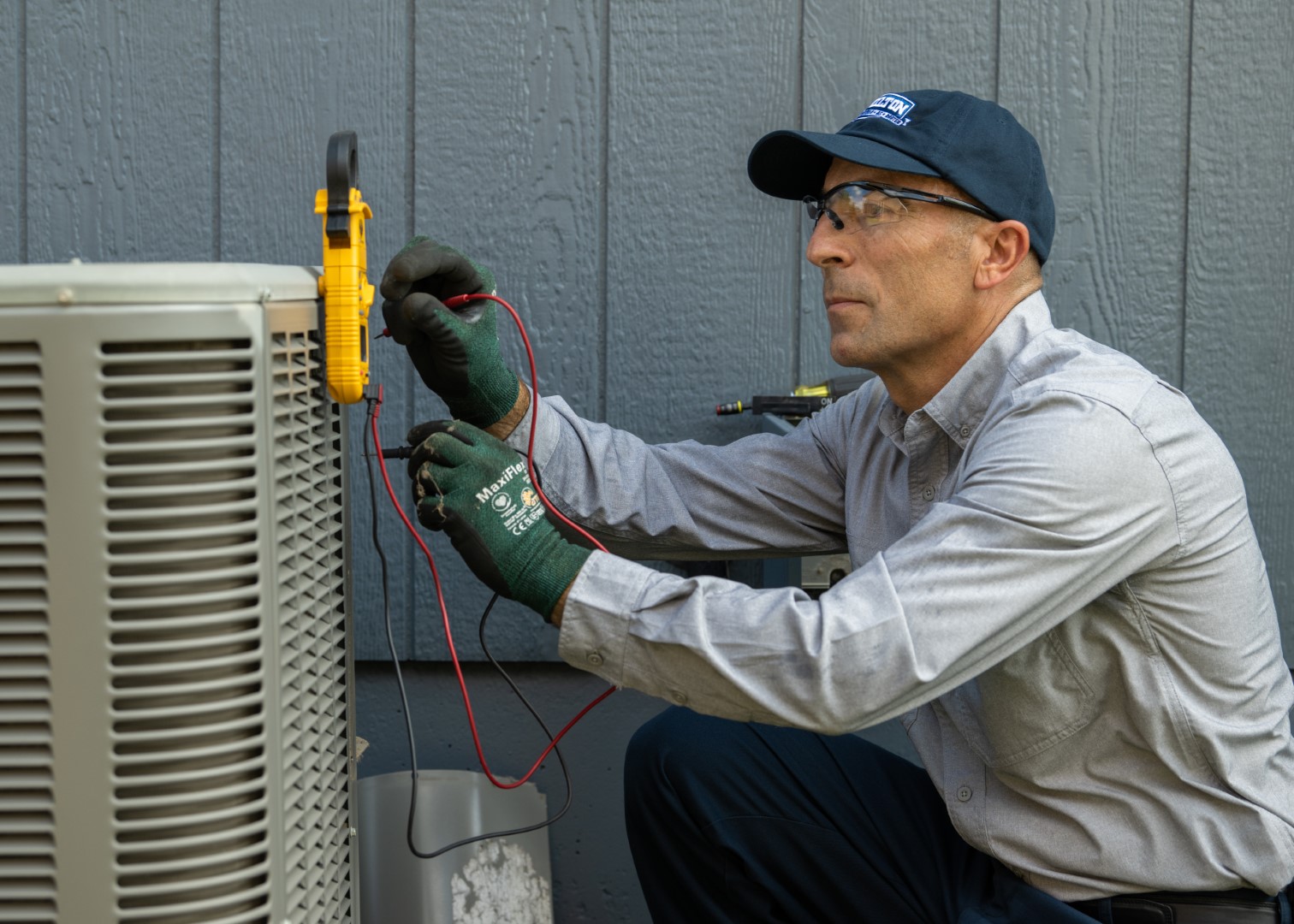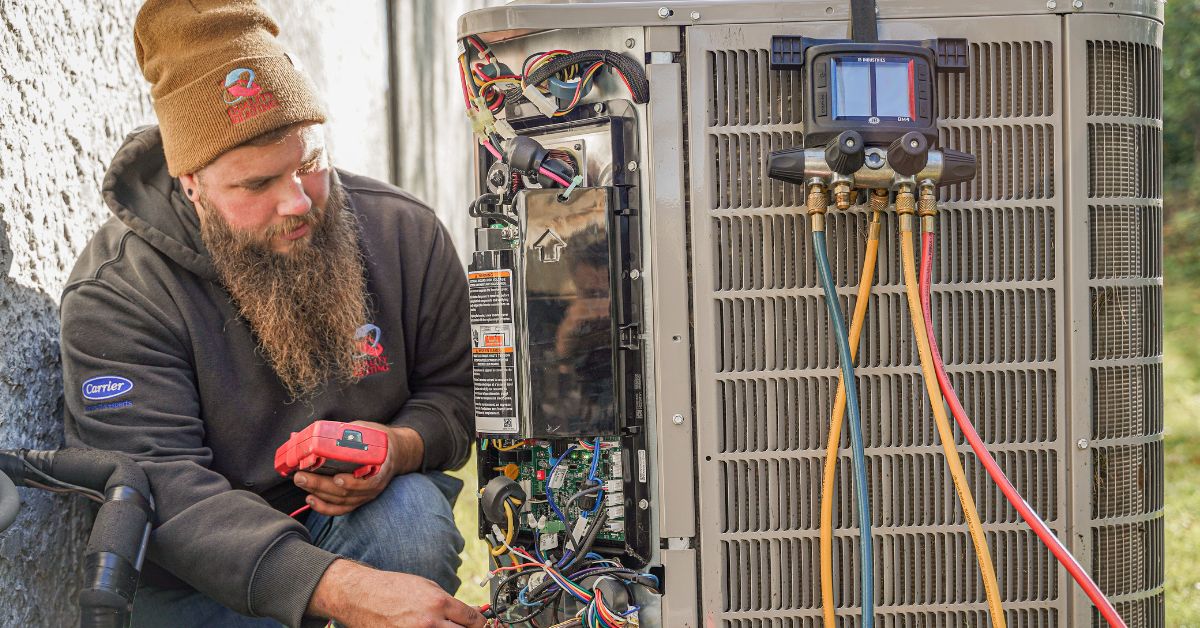Fix broken Air conditioner in peak season — what to do first
Wiki Article
All Regarding A/c: Identifying Common Issues and Effective Air Conditioning Fixing Techniques
Heating and cooling systems are crucial for keeping interior comfort. Understanding their components and capability is essential for determining usual issues. House owners typically face troubles such as inadequate air conditioning, weird odors, or climbing power expenses. These indicators can show underlying problems that may need focus. Checking out DIY troubleshooting strategies can be advantageous, however knowing when to look for professional aid is similarly essential. What steps can be required to assure durable efficiency?Understanding Your Heating And Cooling System: Parts and Functionality
An a/c system, typically taken into consideration the foundation of indoor climate control, contains several crucial parts that work with each other to manage temperature and air quality. The main elements include the heating device, ventilation system, and cooling system. The home heating device, generally a heater or boiler, produces warmth during chillier months, while the cooling unit cools indoor rooms during the summertime.
Typical Heating And Cooling Problems Home Owners Experience
Property owners typically encounter a number of common a/c troubles, including inconsistent temperature level circulation throughout their home. In addition, unusual sounds throughout operation can suggest underlying concerns that call for interest. Addressing these problems promptly is important for keeping optimal system performance.Inconsistent Temperature Distribution
Several households experience the discouraging problem of inconsistent temperature level distribution, where certain areas feel uncomfortably cozy while others continue to be too chilly. This problem usually occurs from a selection of factors, including inadequate insulation, obstructed vents, or an improperly sized HVAC system. When air ducts are not sufficiently secured or when furnishings obstructs airflow, some spaces might obtain inadequate cooling. Furthermore, thermostat positioning can greatly impact temperature level regulation; a thermostat located in a sunlit location may misrepresent the overall temperature of your house. Routine maintenance, consisting of cleansing filters and guaranteeing ductwork is clear, can aid ease these discrepancies. Home owners may also consider zoning systems to much better control temperature levels throughout various areas of the home, promoting a more comfortable living environment.Unusual Sounds Throughout Operation
When a HVAC system runs, unusual sounds can indicate underlying concerns that require focus. Home owners may come across a variety of noises, such as grinding, squeaking, or hissing. Grinding sounds often indicate damaged bearings or components, while squeaking can suggest loose belts or parts needing lubrication. Hissing might indicate a cooling agent leak, which can compromise the system's effectiveness. In addition, banging audios could direct to loosened ductwork or a problem with the blower fan. Each of these sounds functions as a caution, triggering home owners to examine even more. Disregarding these indications can lead to even more substantial issues and pricey repairs. Normal upkeep and punctual interest to unusual sounds can improve system durability and efficiency, ensuring a comfortable living environment.Indications That Indicate Your AC Demands Repair Service
How can one inform if their air conditioning unit requires fixing? Several signs might suggest underlying issues requiring professional interest. First, if the air conditioning falls short to cool down the room efficiently, it might suggest a refrigerant leak or compressor malfunction. Furthermore, a rise in energy bills without corresponding use changes might signify ineffectiveness in the system. House owners need to likewise look out to unusual scents emanating from the device, which might show mold and mildew growth or electrical issues. If the AC frequently cycles on and off, it may be an indication of a malfunctioning thermostat or other mechanical issues. Ultimately, the existence of water pooling around the unit can show a clogged drain line. Acknowledging these indicators early can conserve time and money, ensuring that the air conditioning system operates successfully and properly.DIY Troubleshooting Techniques for HVAC Issues
When facing heating and cooling problems, house owners can use several DIY troubleshooting methods to determine the problem. Key techniques include inspecting thermostat setups, checking air filters, and assessing water drainage concerns. These steps can help identify usual malfunctions prior to looking for expert support.Examining Thermostat Setups
What steps should house owners require to assure their thermostat settings are correct? First, they ought to verify the thermostat is set to the wanted temperature and mode, whether heating or air conditioning. Looking for a clear screen and validating the thermostat is not established to "hold" or "holiday" setting is crucial. House owners need to also validate that the thermostat is level and set up in a place cost-free from drafts, direct sunlight, or other temperature influences. In addition, rectifying the thermostat can assist give accurate analyses. If the thermostat runs on batteries, replacing them may resolve any issues. By systematically evaluating these variables, property owners can frequently you could try these out identify and correct thermostat-related issues, advertising optimal a/c system performance.Inspecting Air Filters
Air filters play a vital duty in maintaining perfect HVAC performance. They trap dust, irritants, and various other fragments, making sure tidy air circulation. With time, filters can end up being stopped up, lowering air flow and performance. To inspect air filters, people should first find the filter, typically discovered in the return duct or near the heating system. As soon as situated, they must assess the filter's condition-- if it appears dirty or stained, it most likely needs replacement. The majority of filters call for changing every 1-3 months, depending on use and ecological elements. Regular assessment and prompt replacement of air filters not just enhance air high quality but also lengthen the lifespan of cooling and heating systems, protecting against possible breakdowns and pricey repair services.
Evaluating Water Drainage Issues
Just how can home owners effectively recognize and deal with water drainage concerns within their a/c systems? Initially, they must evaluate the condensate drain line for blockages or obstructions, which can cause water build-up. Homeowners may utilize a wet/dry vacuum to get rid of any kind of particles obstructing the line. Next off, examining the drainpipe frying pan for rust or leaks is necessary, as a damaged pan can cause water to overflow. Normal cleansing of the drain line with a combination of vinegar and water helps prevent future clogs. Additionally, making sure correct slope of the drainpipe line promotes reliable water circulation. If article source these DIY techniques do not fix the problem, seeking advice from an expert a/c professional might be needed to stay clear of prospective water damages and system failure.When to Call an Expert for AC Fixings

While some AC issues can be taken care of through DIY methods, there are situations where calling an expert comes to be essential. Homeowners need to look for expert help when they come across persistent issues, such as inadequate cooling, unusual noises, or uncommon smells originating from the device. These symptoms may suggest deeper concerns that call for specialized understanding and devices to detect and repair properly.

Preventative Maintenance Tips for HVAC Durability
Routine preventative upkeep can significantly enhance the longevity of cooling and heating systems. House owners need to set up annual inspections by qualified professionals to evaluate system performance and recognize potential concerns. Consistently changing or cleaning air filters is necessary, as this warranties proper air recommended you read movement and decreases pressure on the system. In enhancement, examining and securing ductwork stops energy loss and enhances total performance.
It is additionally a good idea to keep the outside system free from particles and vegetation, permitting peak air flow and warmth exchange. Property owners need to check the condensate drainpipe for obstructions to stay clear of water damages and mold and mildew development. Furthermore, keeping suitable thermostat settings and making use of programmable options can enhance energy performance. Ultimately, recording upkeep tasks assists track solution history and can assist in determining repeating concerns (HVAC company). By adhering to these preventative steps, people can make the most of the effectiveness and life-span of their a/c systems
Regularly Asked Inquiries
Just how Frequently Should I Replace My Heating And Cooling System Filters?
Heating and cooling system filters should usually be changed every one to 3 months, depending on use, filter kind, and environmental factors. Routine substitute assists keep efficiency and air high quality, making sure peak system efficiency throughout the year.What Size A/c System Do I Need for My Home?
To determine the suitable HVAC system size for a home, one must think about square video, insulation high quality, and local environment. Consulting a professional can assist guarantee maximum efficiency and comfort for the particular living space.Exist Eco-Friendly Cooling And Heating Options Available?
Yes, environment-friendly HVAC choices are offered, consisting of energy-efficient heatpump, solar-powered systems, and geothermal heating. These alternatives minimize energy intake and environmental effect, advertising sustainability while keeping reliable environment control for domestic and commercial areas.Just How Can I Improve My heating and cooling System's Power Performance?
To boost HVAC energy performance, one can routinely preserve the system, seal air leakages, set up programmable thermostats, utilize energy-efficient filters, and warranty ample insulation throughout the home to minimize energy intake and improve efficiency.
What Is the Ordinary Life-span of an A/c System?
The typical life-span of a heating and cooling system normally varies from 15 to 25 years, relying on factors such as upkeep, use, and the high quality of setup. Normal maintenance can considerably extend its functional long life.Final thought
In summary, a complete understanding of cooling and heating systems encourages home owners to identify usual concerns and address minor issues properly. Identifying indicators of breakdown, utilizing DIY fixing techniques, and focusing on routine upkeep can enhance system efficiency and performance. When encountered with complex repair work, employing professional assistance is important to guarantee safety and security and durability. By cultivating understanding and proactive care, individuals can enjoy a comfy indoor atmosphere while minimizing unexpected prices connected with a/c failings.Report this wiki page